No products in the cart.

In SEO, measurement is important to success.
Keyword rankings are one of the most common Key Performance Indicators (KPI) used among SEO agencies in Malaysia.
But to look at the full picture of your SEO campaign, you should also measure other meaningful KPIs.
What are Meaningful SEO KPIs?
Simply put, meaningful SEO KPIs have an obvious impact on your SEO campaign.
They provide actionable insights in making business decisions.
In this post, I’m going to talk about 3 SEO KPIs that we usually use to measure our clients’ SEO results.
Let’s dive in.
1) Organic Search Growth
Organic search growth is the increase or decrease of organic traffic over a specific time range.
It shows if your SEO campaign is improving over time.
Google Search Console (which is free) come in handy when tracking organic search growth.
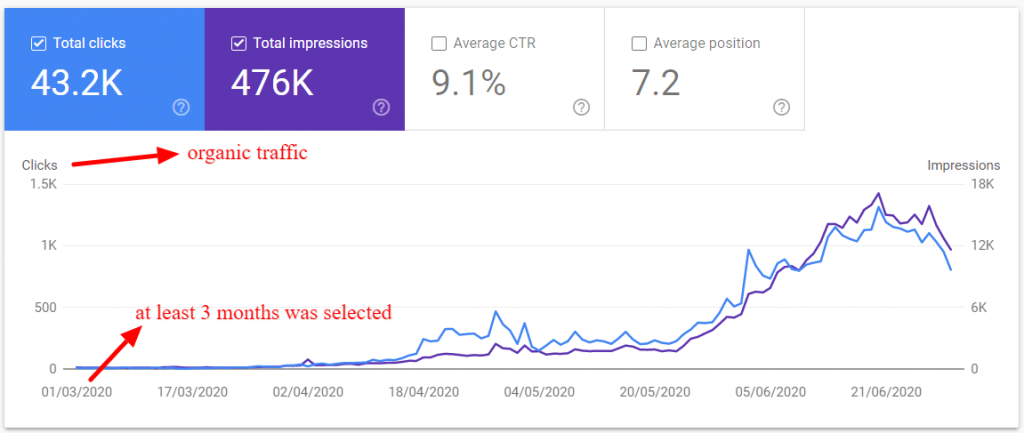
To see your organic search growth, head over to your Google Search Console account > Performance.
Depending on the competition level, the date range we select can be 3-12 months. In this example, we selected 3 months.
The blue colour line is total clicks, showing the visits generated from Google search results.
The purple line is total impressions, showing how many times a user saw a link to your site in Google search results.
Ideally, you want to see both lines going up consistently.
If you see them stagnant or decrease, don’t panic yet.
Some industries are seasonal so it is common to see a decrease in demand after the season is over. For example, the durian industry.
If your industry is not seasonal, you should look into the root cause of the decline.
Ask yourself: Did you make any major changes to your website recently? Sometimes an SEO Audit would help you find out the root cause.
Another way to analyze your organic search growth is by comparing a time range with the previous one:
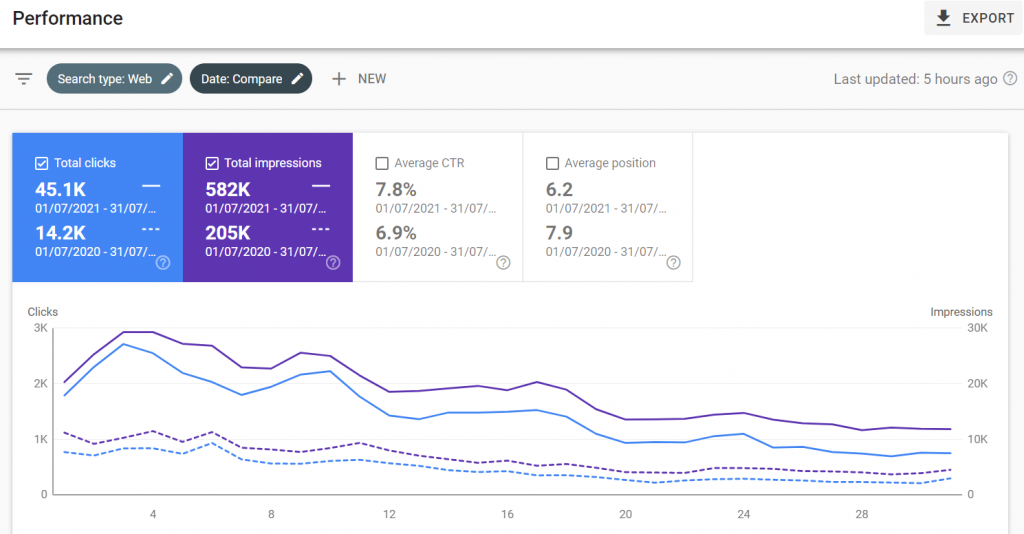
Let’s take the durian as an example again (sorry durian haters!).
You can compare your SEO performance between the same period of this year and last year, eg July 2021 VS July 2020.
This approach is great for seasonal products since you’re comparing month-to-month.
2) Revenue Attributed to Organic Traffic
Revenue is the main reason most businesses want to do SEO.
Thanks to analytical tools like Google Analytics, you can set up goals and track the revenue credited to organic traffic.
You can compare the revenue with other traffic sources. For example, social media might bring you more traffic than organic search but its revenue is much lesser due to the buying intention.
To use this, you’ll need to set up goals in your Google Analytics. If you’re running an online store, you’ll need to enable Ecommerce tracking.
3) Assisted Conversion
The assist in football is the player who passes the ball to the final teammate who then scores.
In SEO, we also have the assist. Although these sources didn’t directly lead to conversion, they play a role to assist the conversion.
Assisted conversion is one of the ways to measure the quality of your traffic source.
To measure the assisted conversion, you can use Google Analytics.

In your Google Analytics account, go to Conversions > Multi-Channel Funnels > Assisted Conversions. What I will do is set the date range to “Last month” and comparing it with the “Previous period”.
Now you can evaluate the improvement or decline of the organic traffic quality.
Keyword Rankings: Do They Still Matter?
Keyword rankings are the most common SEO KPI used by SEO agencies.
At JinMatic, we include the keyword rankings in the monthly clients’ SEO Performance reports.
In recent years, some SEO Specialists express their doubts on the effectiveness of keyword rankings.
We believe keyword rankings are still useful (I’ll explain shortly).
But first, we need to acknowledge that higher rankings don’t necessarily mean higher traffic.
Here are a number of reasons why:
Google Ads Lower Your Clicks
Throughout the years, Google is making its Google Ads design less obvious as an advertisement. And with sometimes 4 Google Ads on top, there is no surprise you receive fewer clicks even if your keyword ranked on position #1.
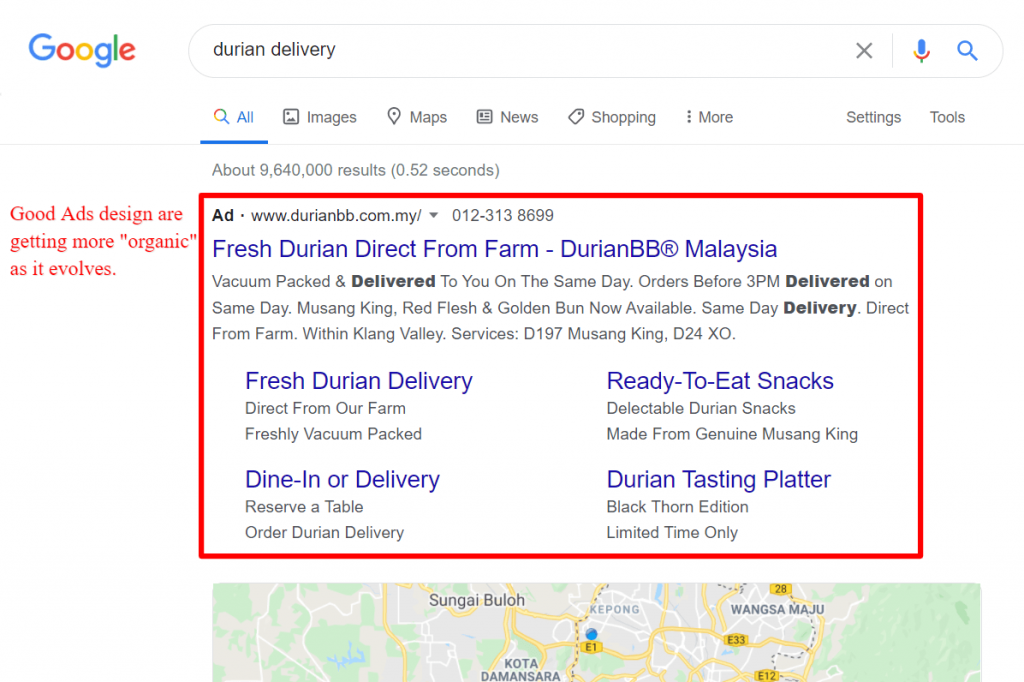
Google Maps Lower Your Clicks
Google Maps help users to find businesses in their community. Combining Google Ads and Google Maps, it may take 2-3 mouse scrolls until you see your organic listing.
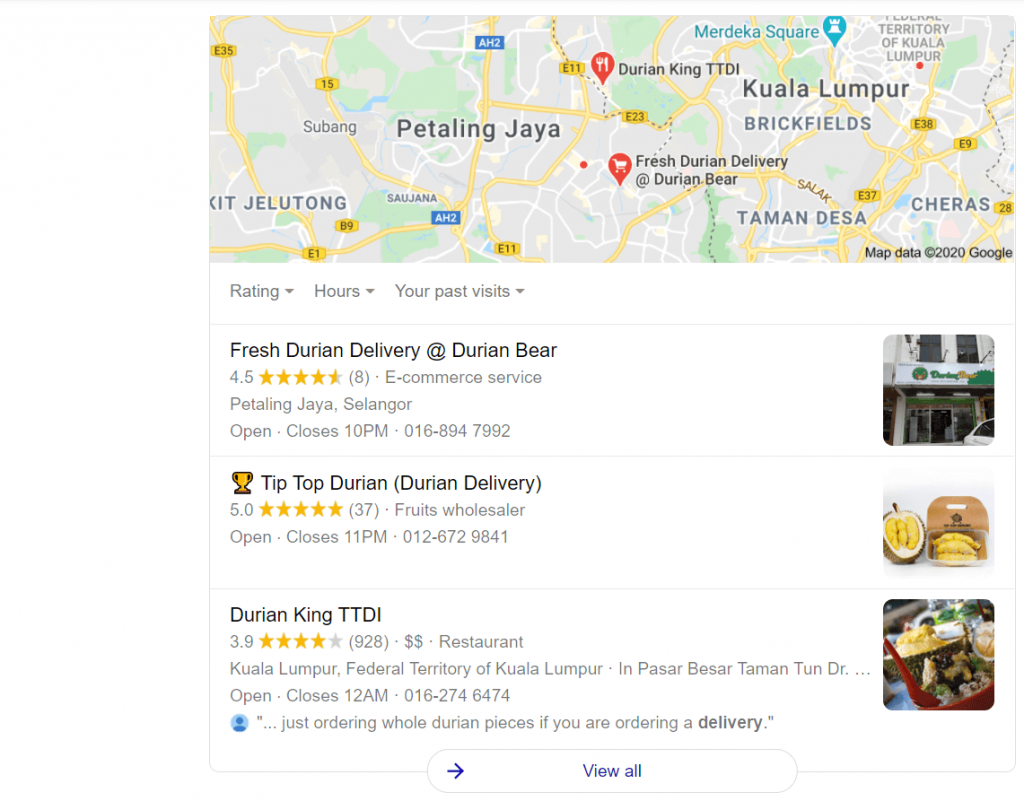
The Keyword Has Low Search Volume
Obviously, you will not receive many clicks from keywords that have only 10-100 searches per month.
Poor Meta Tags
Meta title and meta description are the first things most searchers would scan and decide if they want to click on your search listing.
Poor meta tags can lower your Click-through-rate (CTR). I have written a blog on how to improve your CTR.

Should You Still Measure Keyword Rankings?
Yes, you should. Because keyword rankings are still a good indicator of your SEO progress.
Higher rankings are rewards from Google for providing good content and user experience.
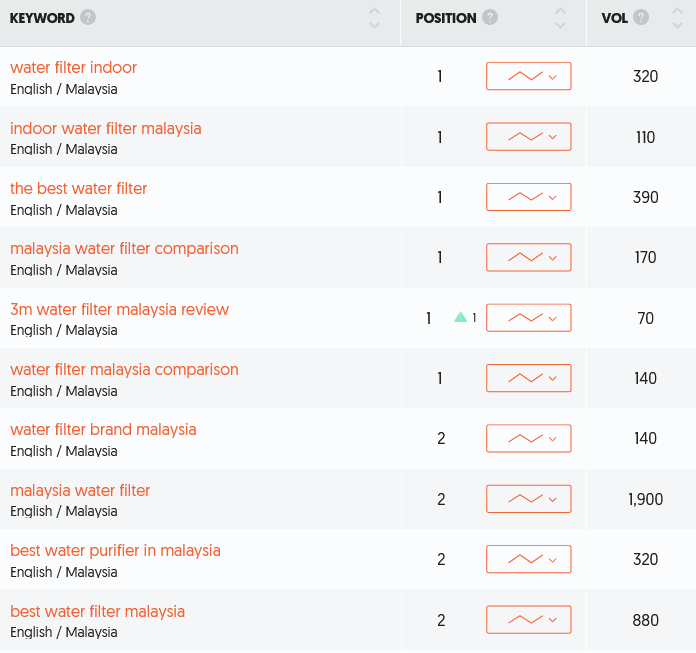
Another benefit of keyword rankings is that they are easy to understand.
Keyword rankings are a good KPI for people who are busy or not familiar with other KPIs.
As compared to impressions, bounce rate, and assisted conversions, keyword rankings are self-explanatory: The higher = the better. It really saves time in measuring your SEO results.
Conclusion
Despite its convenience, you should see keyword rankings as a secondary KPI.
Organic search growth is a more accurate KPI to reflect your overall SEO performance.
You should also pay attention to user experience related metrics like bounce rate and average time on site. This helps you to focus on your visitors.
As for SEO service providers, aside from the ability to measure SEO results, it is equally important to be transparent when presenting your reports to clients.
